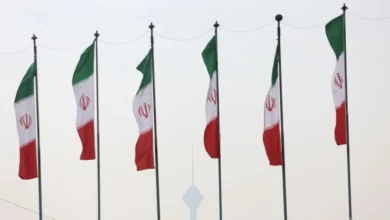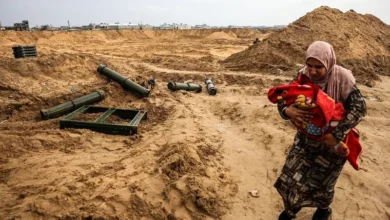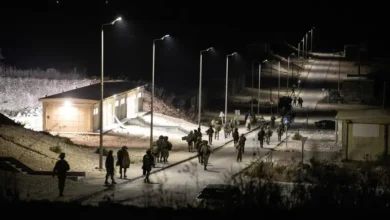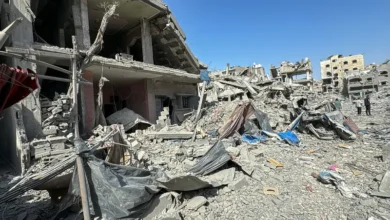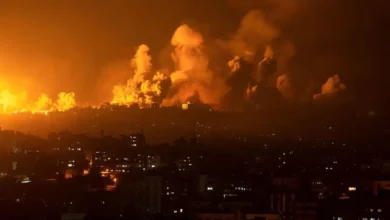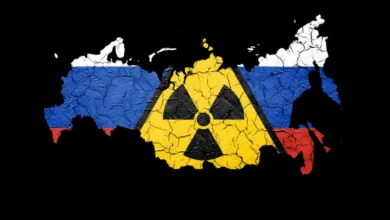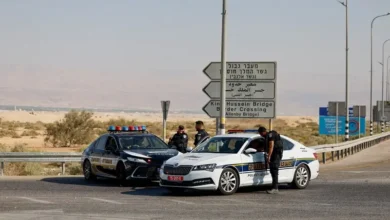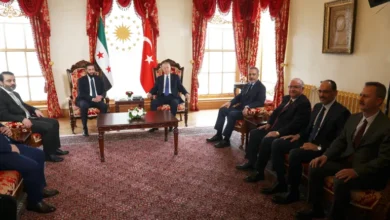What they lost: Families in terror as Israel raids West Bank camps

The rain on Friday did not stop.
Nor did the pounding of Israeli soldiers on the doors of homes across Far’a refugee camp in the occupied West Bank.
Strong winds rushed into houses as doors were knocked down, and the cold bit into the bodies of panicked, unarmed civilians forced into the streets.
In the early hours of the morning, amid an eight-day siege that had cut the camp off from the outside world, dozens of military vehicles and bulldozers rolled up to the camp’s entrance.
Hundreds of Israeli soldiers poured out, swarming through the narrow alleyways. Orders shouted in Hebrew blared from speakers, overlapping with the soldiers’ commands as they banged on doors with the butts of their rifles.
“Open the door! Get out now!” they yelled.
Inside, families scrambled to gather what they could. A mother pleaded to hold her toddler’s hand as he screamed in fear. A father begged to grab a few clothes before being forced outside.
Israel’s invasion of Far’a started with a total lockdown, sealing off all entrances and exits, and cutting off supplies and medical aid. The eight-day siege that followed severed food, water, and power.
Once a bustling refugee camp whose residents were pushed out of 30 villages near Jaffa amid the Nakba, Far’a is a ghost town. Modest concrete homes – once filled with life – stand in eerie silence.
Narrow alleys, turned to sludge by relentless rain, were bulldozed, flattening everything – walls, parked cars, utility poles – leaving behind a trail of destruction.
Ambulances were turned away. Journalists were barred from documenting the raid. Red Crescent teams were prevented from evacuating the wounded. Soldiers moved methodically, expelling families – one neighbourhood at a time.
With nowhere to go, families stumbled through the mud, clutching children and blankets, their shoes sinking into the thick mud of the flooded streets.
The fear was just as thick. A soldier’s impatience or boredom could mean a beating – or a bullet.
‘This house was meant to hold us all’
As the soldiers moved towards the far end of the camp, Awad looked out of his window, trying to think. The retired employee of the Ministry of Tourism knew he had no options.
When soldiers burst through his door, screaming at him, he refused to leave. They beat him with the butts of their rifles and eventually drove him out.
“See this house?” he said, pointing at the home he built, now viewing it from the doorstep of his brother’s house, several blocks away, where he had taken refuge with his wife.
“I built it in stages as my family grew. With six children, the ground floor wasn’t big enough,” he said. Between the arrival of his eldest, 34-year-old Dalal, the youngest 20-year-old Ahmed, the house kept growing.
“Eventually, that floor became our diwan, where we gathered every night. The winters used to feel warm here – with our company, with our laughter,” he said, his left eye swollen, a deep cut beneath it and his knee showing the marks of the soldiers’ blows.
“But when my daughters and sons got married and moved out, it got colder. And when my son Muhammad was killed, it turned freezing.”
Muhammad, his middle son, had left for university in Turkiye three years earlier.
“He left once when he went to study. And then he was gone forever a year ago,” Awad said, his eyes fixed on the house but seeming to look beyond it, recalling that fateful day in April 2024.
“Muhammad had come back to visit, just to check in on his family. He didn’t know he was walking into death,” he whispered.
His voice broke. He leaned onto a nearby chair, pressing a hand to his forehead. “My head hurts from all this,” he muttered. “Let’s go inside.”
The father of six walked slowly to his bed, his legs heavy. Bundled up in layers to fight the cold, he pulled a wool blanket over his feet, rubbing his hands for warmth. He moved carefully, his back bruised from the beatings.
‘They took everything’
“You have to leave,” the soldiers told him when they stormed into his house. “But first, an interrogation.”
The questions came one after another.
“How did your son die? What was he doing? Who were his friends?”

